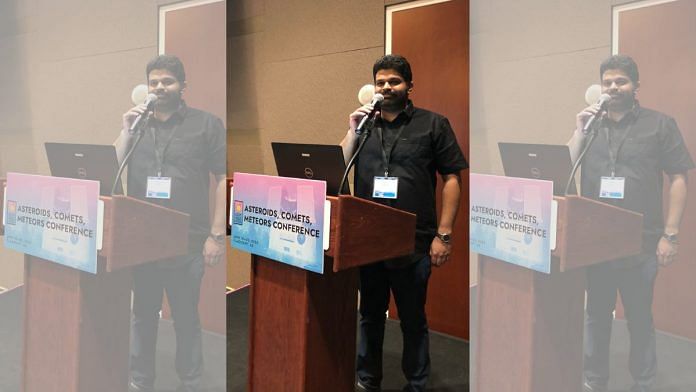New Delhi: Aswin Sekhar, 38 did not get the opportunity to study at an IIT or work at NASA. But he is the first meteor scientist from India to have a minor planet named after him — (33928) Aswinsekhar = 2000 LJ27.
The minor planet or asteroid, around 5.87 crore kilometres away from the Earth, was discovered back in 2000. But it was on 21 June that the International Astronomical Union (IAU) honoured Sekhar’s contribution to the field. He was among four Indians who had asteroids named after them.
Sekhar, an astrophysicist, has been affiliated with the Paris Observatory in France for the past two years. He hopes this badge of honour will instil greater scientific inquiry among the young generation of Indians, particularly those from small villages, like himself.
“This is an award to all those who worked and studied in small institutes like me. I never had the opportunity to go to India’s IITs or IIMs. I never even worked for places like NASA. This is an award for recognising those who don’t go to the top schools or colleges. Maybe even sweet revenge to some,” said Sekhar.
As a solar system dynamicist, he studies the orbits of small bodies in the solar system such as asteroids, comets, and meteors.
“These studies are vital in understanding the history, origin and evolution of our own solar system,” he told ThePrint. His work is also useful to calculate collision risks on Earth due to other bodies in space and also to ensure the safety of satellites and spacecraft from dense meteor swarm strikes.
Also read: Subhas Mukherjee pioneered IVF in India. But the government refuted his work
Love for the sky
Growing up in Ottapalam, a small town in the Palakkad district of Kerala, Sekhar was enthralled by the “pristine night skies”. It’s what inspired him to study the cosmos. The sky was his first love.
“My grandparents used to take me to railway stations to catch late-night trains and the sky was simply stellar over the banks of the beautiful Nila River in Kerala. Trains and skies inspired me from childhood. It was a long journey to learn the cosmos from then on,” he said.
Sekhar continues to credit his roots in Kerala for his success today. Being taken to science museums and planetariums as a child instilled a sense of scientific curiosity within him.
When Sekhar isn’t in Paris, studying meteors and their impact on the Earth and its satellites, he is giving back to his home state by engaging in multiple projects with tribal communities in Wayanad and Idukki.
He conducts mentorship programs and science outreach initiatives in rural schools in these areas to motivate students to take up careers in science. From training sessions to telescopes — Sekhar has created a network of funding and resources to train young minds.
Now, the unassuming meteor scientist has a minor planet named after him.
Also read: Girindrasekhar Bose—India’s first psychoanalyst was pen pals with Sigmund Freud
Naming a minor planet
A minor planet is neither a planet nor a comet. It generally refers to asteroids or other celestial bodies that are much smaller than planets and orbit the sun.
Only asteroids or minor planets that pose no threat to Earth are named after people as a mark of honour.
There are two processes for naming an asteroid. The first is a ceremonial procedure when the scientist who discovered the asteroid discoverer is given the naming rights. They choose a name and suggest it to the IAU, a body of professional astronomers who are active in research, education and outreach. The IAU is the authority on the naming and classification of celestial objects.
In the second non-ceremonial method, senior astrophysicists anonymously nominate a scientist, in recognition of their body of work, to IAU and the Small Body Nomenclature Committee, a group under the IAU that is responsible for assigning names to small bodies in the solar system like minor planets, comets and even satellites of minor planets. Sekhar didn’t discover the asteroid, it was first discovered in 2000 by the Lowell Observatory Near-Earth-Object Search programme which is funded by NASA. His name was nominated under the second method.
He was one of 50 prominent scientists who had minor planets named after them by the IAU on 21 June at the Asteroids, Comets, Meteors Conference 2023 in Flagstaff, Arizona. In a room of about a thousand people, pints of beer and glasses of wine were shared, as Sekhar received this award.
“Aswin Sekhar is the first professional meteor astronomer from India in modern times. He has made important contributions to the field of meteors in meteoroid stream dynamics, particularly in the effects of relativity and resonances in meteoroid streams,” said the IAU on their website.
The number ‘33928’ was randomly assigned to the asteroid by a computing system. The ‘2000’ in the name stands for the year it was discovered.
Sekhar calls this award a “blessed surprise.” Three other Indian scientists also had minor planets named after them: Kumar Venkataramani, an astronomer at CalTech, Ashok K. Verma, a senior flight dynamics engineer at the NASA Goddard Space Flight Center and Rutu Parekh, a planetary geologist studying icy surfaces on various celestial bodies like Mars, at the Jet propulsion laboratory at NASA.
“While there may be a lot of Indians in Science, there are not many Indian scientists in the hardcore astronomy world, or in the studies of small bodies in the solar system. This is a very niche subject,” said Sekhar.
In the past, minor planets have been named after Rabindranath Tagore, legendary vocalist Pandit Jasraj and chess grandmaster Viswanathan Anand.
“Not that I am anything like Viswanathan Anand, but his becoming the Grand Chessmaster really engaged more Indians to start taking up chess. I hope this award has a similar ripple effect on students in India,” says Sekhar.
(Edited by Theres Sudeep)



